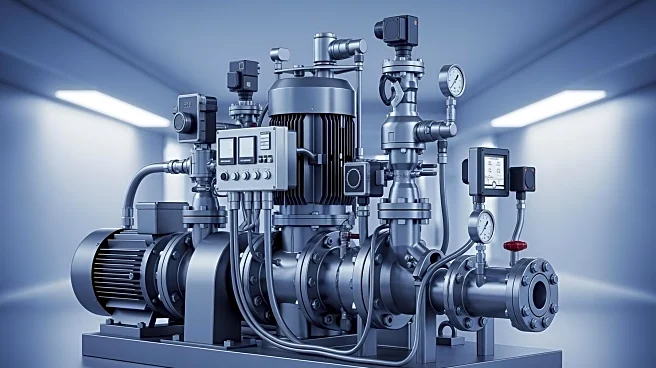What's Happening?
Intelligent fluid management is emerging as a critical factor in enhancing industrial productivity and reducing operational costs. Dr. Cassandra Higham, Industrial Director at Castrol, highlights the importance
of real-time monitoring of lubricants and coolants in manufacturing. These fluids are essential for maintaining machine reliability and product quality. Traditional maintenance approaches, which rely on periodic checks, often lead to unplanned downtime and increased costs. However, advances in intelligent monitoring allow for predictive maintenance, optimizing fluid use and preventing failures. This shift from reactive to proactive maintenance is a key step towards Industry 4.0, offering manufacturers a scalable entry point into digital transformation.
Why It's Important?
The adoption of intelligent fluid management has significant implications for the manufacturing industry. By reducing unplanned downtime and optimizing resource use, manufacturers can achieve cost savings and improve operational efficiency. This approach not only extends the lifespan of machinery but also enhances product quality, which is crucial in sectors like automotive and aerospace. As manufacturers face increasing pressure to improve sustainability and reduce waste, intelligent fluid management provides a practical solution. It also positions companies to better compete in a market where digital transformation is becoming a necessity rather than a choice.
What's Next?
Manufacturers are likely to continue integrating intelligent fluid management systems as part of their broader digital transformation strategies. As these systems become more widespread, companies may see further reductions in maintenance costs and improvements in machine uptime. The transition to condition-based maintenance could also lead to a reevaluation of workforce roles, with a greater emphasis on data analysis and strategic decision-making. Additionally, as the technology evolves, there may be increased collaboration between manufacturers and technology providers to develop more advanced monitoring solutions.
Beyond the Headlines
The shift towards intelligent fluid management reflects a broader trend in manufacturing towards data-driven decision-making. This approach not only improves operational efficiency but also supports sustainability goals by reducing waste and resource consumption. As manufacturers adopt these technologies, they may also face challenges related to data security and integration with existing systems. However, the potential benefits in terms of cost savings and competitive advantage are likely to drive continued investment in this area.








